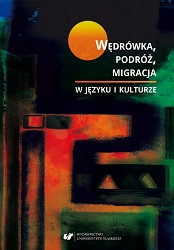
Obraz kryzysu migracyjnego i migranta w prasie niemieckiej na podstawie tygodnika „Die Zeit”
The article constitutes an attempt at analysis of the changes in the image of the migration crisis and the figure of the immigrant within the span of one year (September 2015 – September 2016), on the example of journalistic texts which came out during that time in the German weekly magazine “Die Zeit.” The journal, despite the radicalization of the social climate, attempted to remain moderate in the narrative it provided in the context of the so‑called migration crisis. The key questions for the present analysis, based on the methods of linguistic analysis of discourse, are: Did the development of the situation find its mirror in the form of more critical tone of publications? How is the multinational character of the German society protected? Did, and if so, then to what degree, the moderate, influential weekly publication change the way of reporting on immigrants and the challenges for the contemporary German society connected with an increase in the number of immigrants during that year? Those questions, coupled with analysis of keywords and the ways of conceptualizing the phenomenon, helped the author to attempt an analysis of the linguistic ways of constructing reality in and by the media.
More...
